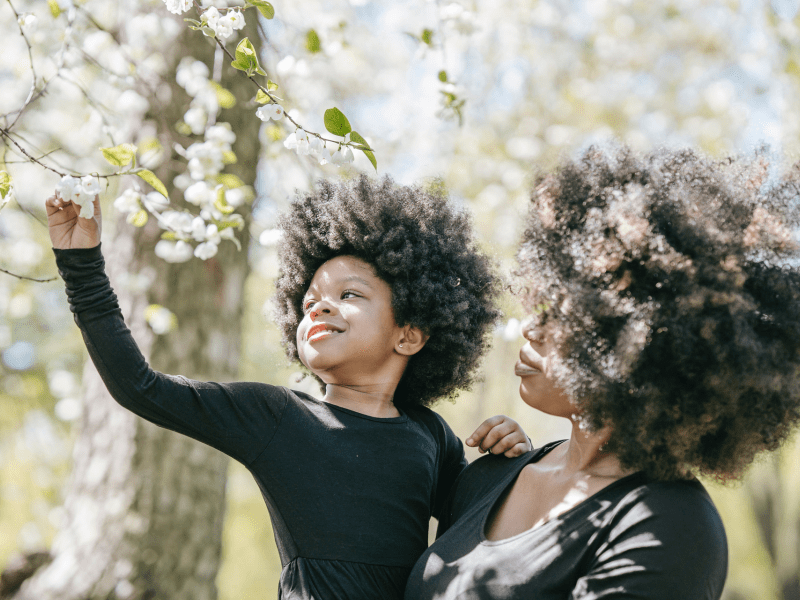Habits That Unite: Empowering Intersectional Environmentalism in Your Everyday Life
In Honor of Black History Month, we’re spotlighting Intersectional Environmentalism and exploring ways to empower the movement.

As we celebrate Black History Month in the US and all of the incredible accomplishments and contributions of Black Americans throughout our history and society, it’s critical that we also focus our energy on uplifting BIPOC communities in the fights they’re currently facing.
One of those fights is the environmental movement, a space that has long silenced, excluded, and victimized marginalized people. But the Intersectional Environmentalist movement is changing that by radically calling out systems of discrimination, dismantling them head-on, and reimagining environmentalism altogether.
WHAT IS INTERSECTIONALITY AND INTERSECTIONAL ENVIRONMENTALISM?
Intersectionality is an important term that was first coined by Professor Kimberlé Crenshaw in 1989. Up until a few years ago, it remained an obscure word that stayed within academic circles. Today, it’s widely used to describe the ways that social categories—such as race, gender, class, sexual orientation, and beyond—intertwine with various systems of discrimination. As we’ll cover in this article, many of these systems depend on each other to perpetuate inequity and show up in so many different ways. One of those ways is environmental racism.
Intersectional Environmentalism was created to combat this form of discrimination. As the inclusive, equitable version of the environmental movement, it advocates for the protection of the planet and all of its people. In other words, it very necessarily accepts and acknowledges the lived experiences of marginalized communities and weaves the concept of intersectionality into the environmental movement. In doing so, Intersectional Environmentalism consciously amplifies the voices of historically marginalized, silenced, and excluded communities. These are the same communities that are, by design, the most vulnerable to climate impacts and catastrophes—specifically, BIPOC, LGBTQ+, disabled, and poor communities.
In honor of Black History Month, we’re shedding light on the fact that these communities have been forced to live, work, and play in the most polluted areas of the United States—and the planet. Throughout history and still today, they’ve been tasked with bearing the heaviest burdens of environmental harm. Below, we’ve outlined a few of the many proven examples of this in practice.
- A 2018 study by scientists of the Environmental Protection Agency found that on average in the United States, Black people suffer a 54% greater health burden due to environmental pollution. That number is 35% for people living in poverty and 28% for the wider BIPOC community.
- A 2019 study confirms Black and Hispanic Americans disproportionately breathe polluted air, which is mainly generated by non-Hispanic white Americans. It’s important to note that Poor air quality is the biggest environmental health risk in the country, playing a role in over 100,000 deaths per year.
- The poorest countries produce one-tenth of global emissions, yet they’re most heavily impacted by pollution, natural disasters, and other climate impacts. The most vulnerable populations in these countries are the most likely to suffer in terms of food availability, clean water access, health, education, and beyond.
As our world leaders race to net-zero emissions by 2050, this worldwide awareness of intersectionality is more important than ever. It helps us ensure our global leaders seek solutions that acknowledge and prioritize marginalized communities—and that’s worth celebrating this month and beyond.
PRACTICING SUSTAINABILITY THROUGH AN INTERSECTIONAL LENS
We know that this topic can sound a bit daunting and theoretical, but there are so many simple ways you can practice it in your everyday life. Whether you’re just beginning your Intersectional Environmentalism journey, or you just want a little bit of inspiration, the baby steps listed below are a perfect place to start.
- Accept the moral obligation to act. Continue to confront the research that reveals the impacts of environmental racism (as you are by reading this article!) and commit to joining the fight against it. Environmental racism differs by area, so be sure to research its impacts in your specific state and city.
- Drop our defenses. Give BIPOC voices a space to speak their truth, and resist any urge to put up a guard. People of color have been ignored, silenced, and fought for too long, so it’s time to let them be heard.
- Start small and local. The key word here is start. Identify a single action you can take to support equity in the environmental movement. Maybe that first step is researching environmental racism in your area, purchasing a book from the Intersectional Environmentalist reading list, or exploring their informative Toolkits.
- Engage your peers and community. Spread the word, especially within white communities. You’d be surprised how many people have never heard of (or simply never accepted) environmental racism. Strike up conversations throughout your day or on social media.
Now that we’ve covered our starting point, let’s dive into more specific action items for both decision-makers and individuals.
AS DECISION-MAKERS
For people of power at any level, it’s more important than ever to acknowledge the effects of poverty and race in the environmental movement and consciously work to reverse them. We encourage political leaders, decision-makers, corporate leaders (ourselves included), and climate experts to challenge history and do their part to empower the next generation. Below, we’ve outlined a few ways to do just that.
- Education: This might look like integrating environmental justice into educational curricula or funding scholarships that recognize oppressive systems and challenge existing inequities. In the corporate context, this might look like fellowship programs such as our E2 Fellowship, which supports emerging professionals and their unique climate projects that promote Intersectional Environmentalism.
- Equitable Partnerships: There’s power in numbers, and it’s important to uplift the organizations that are on the front lines of the movement. Whether it’s Intersectional Environmentalist, the Natural Resources Defense Council (a cherished partner of ours), the National Conference for Community and Justice, the Climate Justice Alliance, or another incredible organization, seek partnerships that support on-the-grounds progress in this space.
- Adjust Your Approach: When it comes to adopting new frameworks for decisions, it’s important to take an approach that truly centers on the local community. Researchers call this “Place-Based Planning,” as it genuinely considers context and prioritizes historically disadvantaged residents in the context of urban decisions. This challenges expert-driven approaches that favor privileged classes—instead, it caters to the needs and histories of the people who live there.
AS PASSIONATE INDIVIDUALS
As individuals, we can continue to promote Intersectional Environmentalism through the following initiatives.
- Engage with BIPOC climate activists. Intersectional Environmentalist is a non-profit climate justice collective founded by Leah Thomas (@greengirlleah) with a mission to imagine and create an equitable and diverse future for environmentalism. Leah is a perfect example of a Black activist to follow and support. Following her (and the accounts she admires herself) can offer you daily reminders of how to see your world through an intersectional lens and amplify silenced voices. Supporting BIPOC activists and nature lovers like Leah also helps the next generation to feel like they truly belong in the environmental movement.
- Support grassroots initiatives within Black and marginalized communities. Explore environmental causes within the Black community. This article by Earth911 offers 12 organizations to support, and their causes range from engaging the hip-hop community to encouraging Black communities to explore new outdoor activities. Intersectional Environmentalist offers community-oriented events that raise awareness for environmental justice.
- Vote for leaders who are committed to Intersectional Environmentalism. And hold them accountable, too! Engaging in climate policy and activism is one of the most productive ways to fight environmental racism, as our public officials (and their decisions) have the power to generate a massive ripple effect. To support Intersectional Environmentalism, stay up to date on issues in your community, know what your officials stand for, and hold them accountable through ballots and boycotts.
- The Environmental Voting Project is an incredible US resource if you’re looking to become a consistent voter for the planet. One of their core values is empowering the oppressed within the environmental movement.
- Host and attend inclusive events. In 2022 alone, Intersectional Environmentalist hosted book tours, film screenings, clothing swaps, Earth Sessions concerts, educational pop-ups, and more. We hope you feel inspired to host your own similar events, whether it's within your closest friend group, your neighborhood, your campus, or beyond.
Across our properties, we take pride in honoring and uplifting Black farmers, chefs, creatives, practitioners, and community members through events and initiatives all year long. This month, join us for special Black History Month celebrations that engage and unite us all.
CELEBRATE BLACK HISTORY MONTH AT 1 HOTELS
From sustainable pop-up shops showcasing BIPOC-owned brands to immersive wellness experiences led by expert Black practitioners, join us in uplifting Black voices and contributions across our sanctuaries.













